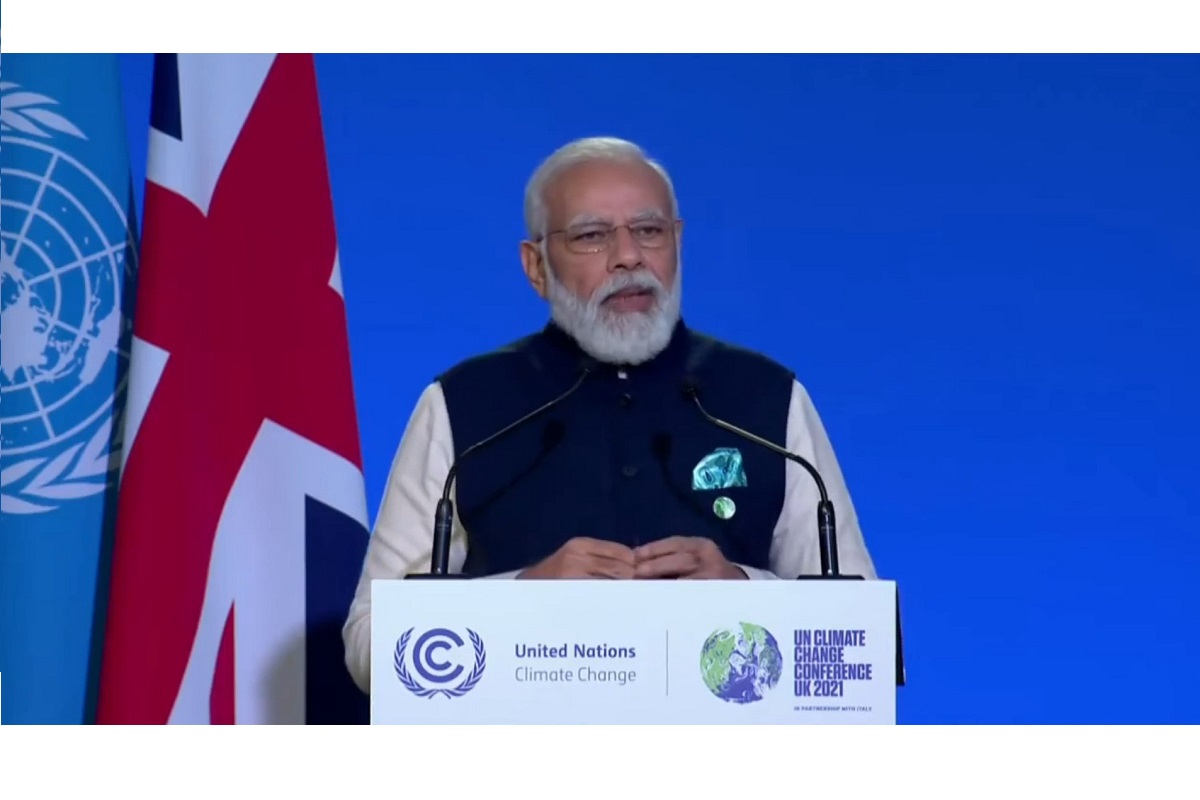K Kavitha questions Modi’s silence on Adani US bribery indictment
Political opponents are arrested without evidence and put on trial for months while Mr Gautam Adani walks free despite repeated and grave allegations, she said.
Modi said ‘One Word One World’ movement mantra — ‘Life, Lifestyle for Environment’ can be a mass movement wherein instead of mindless and destructive consumption, there should be mindful and deliberate utilisation.

(Credit : @narendramodi/twitter)
Offering a new mantra and raising its pledge for combating climate change, Prime Minister Narendra Modi told world leaders at the COP26 that India will target a net-zero goal by the year 2070 and aim at increasing its non-fossil fuel energy to 500 GW in its energy mix by 2030.
Terming it as ‘Panchamrut Ki Saugat’ – India’s contribution to climate action called as Nationally Determined Contributions (NDCs), Modi while speaking on the first day of the high-level segment at the COP26 said India will reduce its carbon intensity by 45 per cent by 2030 starting with reducing projected carbon emission from now till 2030 by 1 billion tonnes and committed to having renewable energy component of 50 per cent by 2030.
Modi gave a new mantra for sustainable development through a sustainable lifestyle. Displaying his penchant for acronyms, Modi said ‘One Word One World’ movement mantra — ‘Life, Lifestyle for Environment’ can be a mass movement wherein instead of mindless and destructive consumption, there should be mindful and deliberate utilisation.
Advertisement
India’s earlier target was to reduce the emissions intensity of its GDP by 33-35 per cent by 2030, compared to 2005 levels with already 24 per cent achieved by 2016. Ahead of the COP, India was under pressure from rich nations to declare a net zero target year — where the amount of carbon emitted needs to be balanced with either removal or absorption of equal amount — but had declared that it will be done at an appropriate movement.
The west has always painted India as the third-largest emitter after China and the US while India has maintained its per capita emissions are nowhere near the highest emitters.
However, Foreign Secretary Harsh Vardhan Shringla, addressing media after the day’s events here denied there was any outside pressure.
“It is for the posterity we are making this effort. It is an important commitment to our future generations. Net-zero for India will mean the shortest gap from here and the peak emissions. The leader of a country that sets a target of 175 GW, he sets his own target of 450 GW and now sets a target of 500 GW progressively is not doing it under any pressure. The only pressure on him is the pressure of humanity, the pressure of our own future.”
“India is not going to be pressurised; will not be pressurised and has never been pressurised in any way. We are doing it of our own volition. The projections are based on science,” he said.
Modi called out promises made by rich nations to date have been hollow, and said, “Just like India has raised its ambition, the rich nations, too, need to raise theirs. Climate finance and technology transfer agreements cannot remain the same.”
He exhorted the rich nations to enhance to 1 trillion US$ for climate finance and low-cost technology transfer and said it is needed to track climate finance.
Taking cudgels on behalf of the developing world, Modi appealed to all nations to take bolder steps.
This COP26 is deemed critical because as warned by the Intergovernmental Panel on Climate Change (IPCC), every additional 0.5 degrees of warming will increase heat extremes, extreme precipitation, and droughts and for coastal areas, sea-level rise will be a threat to their very existence.
Before the COP, India had announced adaptation was one of the important aspects for consideration. Accordingly, speaking at a side event, the Prime Minister said adaptation, not mitigation, should get priority for the development imperative of developing countries.
“Adaptation does not get as much importance in the global climate debate as mitigation. This is an injustice to developing countries, which are more affected by climate change,” Modi said at the event on ‘Action and Solidarity — The Critical Decade’ at COP26 Summit.
Modi held a bilateral meeting with British Prime Minister Boris Johnson where the two leaders reviewed the implementation of the ‘Roadmap 2030’ priorities, particularly in trade and economy, people-to-people, health, defence, and security areas. They expressed satisfaction at the progress in delivering the enhanced trade partnership, including steps taken towards the launch of free trade agreement negotiations.
He reiterated India’s commitment to closely working with the UK on climate finance, technology, innovation, and adaptation of green hydrogen, renewables, and clean technologies, including joint initiatives under the International Solar Alliance (ISA) and Coalition of Disaster Resilient Infrastructure (CDRI).
Advertisement